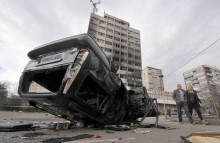There are some striking similarities between last week’s events in Bosnia and what is going on in Ukraine, in terms of confrontation between citizens and law-enforcement troops, also along the social and psychological lines. Public unrest.
BACKGROUND
Violent protests in Bosnia and Herzegovina began on February 5 in Tuzla, after the local factory had been closed, leaving most citizens jobless. From Tuzla public unrest spread to other cities with the highest unemployment rate in the Balkans (almost 28 percent). Protesters stormed and burned down local administration buildings, and set fire to the presidential palace in Sarajevo. Riot squads stepped in, using tear gas, water cannons, and rubber bullets. Media reports point to more than 300 people injured or otherwise affected. The heads of the canton administrations of Tuzla, Zenica, and Sarajevo resigned. What happened in Bosnia could only be compared with the Civil War of 1992-95.
Experts say the main reason for public unrest in Bosnia is rampant corruption, along with a difficult domestic economic and political situation, and the government’s passive attitude. Last year Bosnia’s EU membership was suspended by the European Court’s ruling to the effect that Bosnia was acting contrary to the rights of the ethnic minorities, and that its government allowed only Bosnians, Serbs, and Croats to have seats in parliament. In the end, Brussels’ aid worth 47 million euros was transferred to other candidate EU member countries. And this considering that the Bosnian administration signed the Association Agreement back in 2008 (after that Bosnia registered higher average wages, GDP, and other economic indices, but the unemployment rate kept on an upward curve, leaving Bosnia listed as one of Europe’s poorest countries).
GROWING PAINS
Deprivation. Any dictionary will tell you that it means the lack of something that you need in order to be healthy, comfortable, or happy. In terms of politics these days, it means the painful difference between what you would like to have and what you actually have. This painful disillusionment brings forth public unrest. Experts say there are three deprivation models relying, respectively, on the awareness of social injustice in terms of distribution of wealth; the aggravating domestic economic situation, with comparisons made with past “better” realities, and when the economic situation gets better and people can expect a higher living standard, but then comes another stagnation or GDP decline, resulting in a progressive deprivation period, when the man in the street says all his economic expectations went down the drain.
This third deprivation model obviously applies to what has happened in Bosnia. After signing the Association Agreement, Bosnia’s economic indices registered a degree of progress, promising a solution to the biggest unemployment problem. Lost opportunities, as evidenced by what happened in February, with public unrest almost reaching boiling point, with people being aware of rampant corruption “upstairs” and general dissatisfaction with the government’s stand, particularly its decision to suspend EU membership procedures.
UKRAINE
The similarity between what is going on in Bosnia and Ukraine is obvious, with the police using tear gas, rubber bullets, seizing the buildings of local authorities, etc. Above all, the reason behind this public unrest in both cases appears to be the same: public dissatisfaction with the slowing down of the European integration process, and the abovementioned progressive deprivation model that can apply to Ukraine in 2011-13, even if to a degree.
Back in 2011, experts generally agreed that Ukraine’s economy was working under President Viktor Yanukovych. Some even said that the Cabinet had something to put into its assets portfolio, particularly in terms of foreign economy breakthroughs.
In 2012, Ukraine’s economy suffered a number of failures, so much so that most international organizations revised their forecasts concerning our economy and said Ukraine was in a bad way.
In 2013, Ukraine’s economy found itself in a state of recession, officially recognized because of the GDP indices that had kept on a downward curve in the last half of the previous year.
The economic system of Ukraine was very negatively impacted by lower official foreign reserves, rising public debt, weakening trade balance, also by the loss of important foreign markets, closure of unprofitable businesses, massive outflow of capital, mounting corruption, crime rate, to mention but a few.
After refusing to sign the Association Agreement, Ukraine found itself faced with the grim consequences, with the Ukrainian in the street expecting something from Europe, receiving nothing and ending up down on the Euromaidan, protesting the system, exposing himself to Berkut riot squad police brutality. Public unrest in Ukraine has been underway for more than two months.
That’s how Ukraine’s economy has traveled the path from a degree of progress, back in 2011 (with big social expectations in the next two years), to the current harsh reality. Hence the parallel with Bosnia, rampant corruption, suspended EU membership, and above all, public distrust of the proverbial powers that be.







